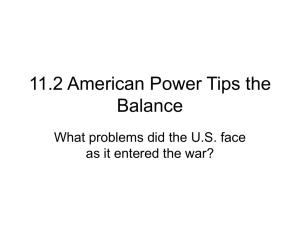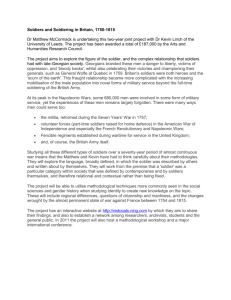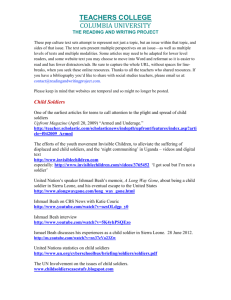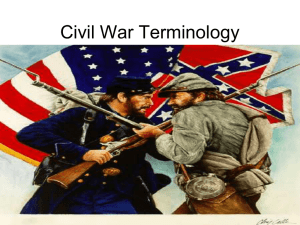Child Soldiers Plan AC
advertisement
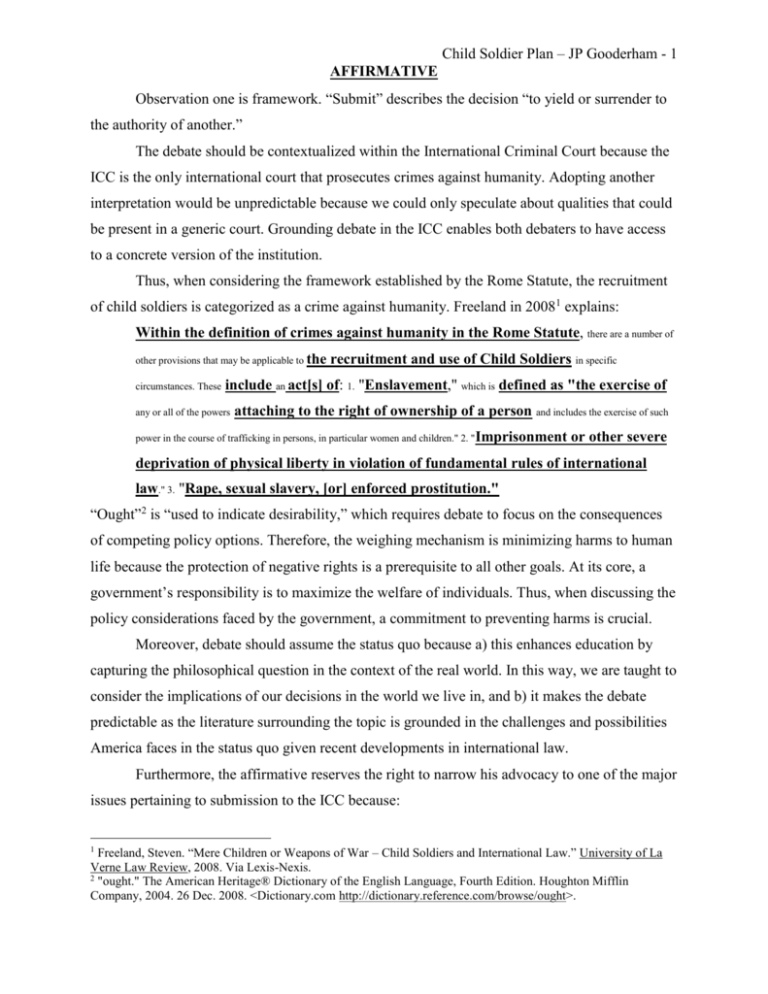
Child Soldier Plan – JP Gooderham - 1 AFFIRMATIVE Observation one is framework. “Submit” describes the decision “to yield or surrender to the authority of another.” The debate should be contextualized within the International Criminal Court because the ICC is the only international court that prosecutes crimes against humanity. Adopting another interpretation would be unpredictable because we could only speculate about qualities that could be present in a generic court. Grounding debate in the ICC enables both debaters to have access to a concrete version of the institution. Thus, when considering the framework established by the Rome Statute, the recruitment of child soldiers is categorized as a crime against humanity. Freeland in 20081 explains: Within the definition of crimes against humanity in the Rome Statute, there are a number of other provisions that may be applicable to the circumstances. These recruitment and use of Child Soldiers in specific include an act[s] of: 1. "Enslavement," which is defined as "the exercise of any or all of the powers attaching to the right of ownership of a person and includes the exercise of such power in the course of trafficking in persons, in particular women and children." 2. " Imprisonment or other severe deprivation of physical liberty in violation of fundamental rules of international law." 3. "Rape, sexual slavery, [or] enforced prostitution." “Ought”2 is “used to indicate desirability,” which requires debate to focus on the consequences of competing policy options. Therefore, the weighing mechanism is minimizing harms to human life because the protection of negative rights is a prerequisite to all other goals. At its core, a government’s responsibility is to maximize the welfare of individuals. Thus, when discussing the policy considerations faced by the government, a commitment to preventing harms is crucial. Moreover, debate should assume the status quo because a) this enhances education by capturing the philosophical question in the context of the real world. In this way, we are taught to consider the implications of our decisions in the world we live in, and b) it makes the debate predictable as the literature surrounding the topic is grounded in the challenges and possibilities America faces in the status quo given recent developments in international law. Furthermore, the affirmative reserves the right to narrow his advocacy to one of the major issues pertaining to submission to the ICC because: Freeland, Steven. “Mere Children or Weapons of War – Child Soldiers and International Law.” University of La Verne Law Review, 2008. Via Lexis-Nexis. 2 "ought." The American Heritage® Dictionary of the English Language, Fourth Edition. Houghton Mifflin Company, 2004. 26 Dec. 2008. <Dictionary.com http://dictionary.reference.com/browse/ought>. 1 Child Soldier Plan – JP Gooderham - 2 AFFIRMATIVE a) given the time limits, debaters may never address the entire set of potential arguments on a particular side. Thus, any attempt to require a debater to defend a specific number of cases would be unfair since we have no established rule to determine the breadth of the resolution that must be covered. b) insofar as the affirmative advocacy operates on the basis of a weighing mechanism, the negative has numerous options to challenge the affirmative case no matter how many or few issues the advocacy covers. Moreover, a focused debate is necessary for education by forcing debaters to explore complex questions raised by the resolution in far greater depth. Finally, as there are always multiple valid interpretations of any resolution, prefer the affirmative interpretation as long as I am being reasonable and open to negative responses to compensate for time skew. Observation two is inherency and harms. America has contributed to the inability of the ICC to successfully prosecute child soldier recruiters. Abbott in 20003 writes: While the United States resisted the establishment of the ICC, the United States also specifically opposed the inclusion of the use of child soldiers in international armed conflict as a war crime falling under the jurisdiction of the ICC. 208 Instead of supporting an effective court, the United States maintains its position with the hope of convincing other states to adopt a statute that satisfies the U.S. Government. 209 By hindering the establishment of a permanent international body that would consider crimes against humanity, the United States only further undermines international efforts to provide special protections to children. 210 Singer in 20044 argues: Groups do not accidentally choose to use child soldiers, nor are they motivated by pure malice. They have underlying interests and have deliberately set up special processes for the recruitment, indoctrination, and utilization of child soldiers because they believe they will draw certain advantages from the practice. 77 These calculations must be altered in order to defeat the overall habit of using child soldiers. One strategy is to criminalize the practice. The legal transgressions involved in child soldiering are almost too numerous to make an Abbott, Amy Beth. “Child Soldiers – The Use of Children as Instruments of War.” Suffolk Transnational Law Review, Summer, 2000. Via Lexis-Nexis. 4 Singer, P.W. “Talk Is Cheap: Getting Serious About Preventing Child Soldiers.” Cornell International Law Review, 2004. Via Lexis-Nexis. 3 Child Soldier Plan – JP Gooderham - 3 AFFIRMATIVE exhaustive list. The use of child soldiers has violated the laws of war for over four millennia. Indeed, as one expert notes of child soldier commanders in the D.R.C., "they know it's a war crime, but they seem to believe they'll never be brought to justice. There is a sense of rampant impunity." 78 The problem is that, so far, these commanders have been correct. Next are harms. First, the use of child soldiers leads to a long-term impact of civil war and violent conflict as a result of the psychological and physical trauma that child soldiers face. Acharvina and Reich in 20065 explain: Yet despite its relatively low profile in both realms, child soldier recruitment is important because it involves the suffering and death of thousands of children every year -- many more than are direct victims of terrorism or the use of weapons of mass destruction. Concerns about the immorality of their recruitment and transgression of the rules of war might be regarded as self-evident. But to this consideration can be added several others, including the heightened exposure of naive children to the risks of death or injury in combat; the difficulty of rehabilitating child combatants; and the excessive cruelty inflicted by some child soldiers on their victims. It has long been understood that socialization into violence in youth creates a generation of violent adults, perpetuating a vicious cycle of instability within countries. Now, according to the aforementioned media reports, child soldiering has become intertwined with terrorism, suggesting that the increasing use of child soldiers poses a long-term threat to the health and security of societies far beyond the borders of the war-torn, fragile states in which these civil and ethnic conflicts take place. If their rehabilitation is difficult but necessary for the future stability of societies, then prevention is arguably even more vital and less costly. Moreover, severely limiting the use of child soldiers would prevent hostile warlords from continuing their perpetual civil wars. In terms of timeframe, the use of child soldiers poses a constant threat to human rights by a) allowing for conflict in the status quo, and b) catalyzing civil wars in postconflict society in the future. Second, child soldiers pose a severe threat to the international community as potential terrorists. Singer in 20056 argues: The decay of local law and order in these states give outside extremist groups freedom of operation. These zones then become a magnet for global terror groups that are seeking to take advantage of the local void in governance. As al Qaeda’s basing in Afghanistan illustrates, terrorism tends to thrive where failing or failed states are too weak to stamp it out. Indeed, even state failures that are seemingly disconnected to this threat can still have dangerous consequences. For example, policymakers in Washington were 5 Vera Achvarina and Simon F. Reich; Vera Achvarina is a doctoral candidate at the Graduate School of Public and International Affairs (GSPIA) at the University of Pittsburgh. Simon F. Reich is Director of the Ford Institute for Human Security at the University of Pittsburgh and Professor of International Affairs at GSPIA. International Security Summer 2006 6 P.W. Singer, Senior Fellow in Foreign Policy Studies at the Brookings Institution. 2005. Children at War. Pg. 9596. Child Soldier Plan – JP Gooderham - 4 AFFIRMATIVE unconcerned by also had groups. Sierra Leone’s collapse in the 1990s, as they saw little strategic value in the tiny country. Its state failure more to do with the child soldiers of the RUF than al Qaeda or any other terrorist Nonetheless, the tiny West African country served as a critical node in the fund- raising efforts of Osama bin Laden’s al Qaeda network. The group used the chaos of Sierra Leone’s war to hid its own activities, including the conversion of al Qaeda cash into more easy to smuggle diamonds in the period just before the 9/11 attacks. Thus, the plan. The U.S. should submit to the ICC in order to redress the flaws in domestic law and empower the international community to prosecute offenders. America should meet international obligations concerning the use of child soldiers (i.e. honor sanctions on weapons trade with nations that use children for military purposes) while supporting the ICC’s prosecution of at-large warlords. Observation three is solvency. First, America’s leadership would facilitate the improvement of court practice in cases involving child soldiers. Singer in 20047 writes: The United States, as well as other members of the international community, should also support modifications to the ICC that will convert it into a more effective tool to combat the use of child soldiers. For example, the Court's rules might be amended, in order to allow children to testify before the Court, to allow direct sufferers to bring the practice to the fore. Another possibility would be to convene a tribunal to indict and prosecute those presently using child soldiers around the globe, not just address the aftermath of specific wars. The international community should not wait for the termination of a war crime before prosecuting those responsible. The ICC could start by indicting the leaders of twenty-three warring groups that have been found by the UN Secretary-General to be using child soldiers. Targeting the global child soldier practice might be an excellent Marbury vs. Madison for an already besieged Court seeking to establish its credibility and standing. In addition to providing military support, using America’s diplomatic leadership as a Party to the Rome Statute would enable the U.S. to provide direction to the court. After focusing on the court’s shortcomings, it will be better equipped to address international crimes and bring perpetrators to justice. Singer, P.W. “Talk Is Cheap: Getting Serious About Preventing Child Soldiers.” Cornell International Law Review, 2004. Via Lexis-Nexis. 7 Child Soldier Plan – JP Gooderham - 5 AFFIRMATIVE Second, submission would require the U.S. to cease its sales of arms to nations that employ child soldiers. McManimon in 19998 explains: The U.S. must take responsibility for the ways in which its own laws and practices foster the use of child soldiers and warfare against children. Congress should explore how U.S. weapons aid and training facilitate the use of child soldiers. Accordingly, it should monitor the entire process and investigate the end use of U.S. weapons shipments, including both weapons given as aid and arms that various government bodies have authorized for legal sale by U.S. manufacturers. This oversight is particularly important in curbing the vast illegal weapons trafficking (especially of small arms), upon which armed opposition groups rely. Additionally, U.S. aid should focus on universal access to basic education, food security, and primary health care, which are important factors in keeping children out of conflict. Submission is beneficial in that it would bind America to international agreements governing relations with nations that use child soldiers. In doing so, America would be unable to fuel armed conflict involving children with the direct or indirect sale of arms. Moreover, by establishing a commitment to justice for children, the U.S. would provide aid to nations and consequently undermine the recruitment efforts of rebel militias. Third, submission would force the US to relinquish its opposition to international standards for child soldier usage. McManimon in 19999 writes: Strong international norms can provide a critical basis to prevent and stop the use and recruitment of children as soldiers. To this end, the U.S. should ratify all treaties relating to child soldiers: the Additional Protocols to the Geneva Conventions, the CRC, the ICC, and ILO Convention No. 182. Once ratified, these conventions should be incorporated into U.S. national legislation and programs. The U.S. must also immediately cease any attempts to block current and future international efforts to raise the minimum age for soldiering to 18, especially in negotiations on the CRC. In keeping with international trends, the Defense Department and Congress should raise the U.S. recruitment age to 18 and ensure that presently enlisted 17-year-olds are not deployed to potential combat zones. 88 In addition, the U.S., with its stated commitment to human rights, McManimon, Shannon. “Use of Children as Soldiers.” American Friends Service Committee, Vol. 4, Number 27, Nov. 1999. http://www.fpif.org/briefs/vol4/v4n27child.html 9 McManimon, Shannon. “Use of Children as Soldiers.” American Friends Service Committee, Vol. 4, Number 27, Nov. 1999. http://www.fpif.org/briefs/vol4/v4n27child.html Child Soldier Plan – JP Gooderham - 6 AFFIRMATIVE should help to establish prompt, objective monitoring and effective enforcement of agreements regarding child soldiers, particularly through the existing UN Commission on the Rights of the Child. Though America continues to use child soldiers in our military missions, joining the ICC would strengthen the international norm against the practice. In turn, America would be empowered to exercise leadership to prevent child conscription globally. Fourth, submission is crucial to empowering the US to direct the ICC in prosecuting. Nolte10 in 2003: The fourth core national interest is to preserve international recognition of the country’s leadership role. This role not only enables the United States to take the lead in altruistic projects for the benefit of humankind but also facilitates the safeguarding of core national interests. If the United States continues to remain outside of the ICC project which has become a symbol of the international community’s self perception its reputation as a perspective leader of the world community will probably suffer in the long run. This prospect should not be underestimated. particularly in the wake of September 11, The need to build coalitions in the US-led war on terrorism, suggests that legitimacy is decisive for the capacity to safeguard national interests. The US decision about whether or not to participate in the court is not a onetime technical issue that will quickly be forgotten. It is true that the nonparticipation of the United States will not have an immediate effect in any particular context. Still, once the court begins operations, the question of US support will become a topic of frequent debate. Opponents of the United States will regularly have a plausible argument against US foreign policy. Depending on the importance that one accords to credible moral claims in international relations, the diminished moral high ground of US foreign policy could have practical effects in the long run. The possible impact of credible propaganda directed against the United States in the name of the international community, may slowly undermine the US national interest to preserve its recognized leadership role. Thus, in order to build a coalition against the use of child soldiers as a global leader, America must affirm its commitment to justice by joining. In turn, America eliminates the objections to US leadership of hypocrisy and exceptionalism. Thus, I affirm. 10 Nolte, Georg. Unilateralism and US Foreign Policy, 2003. P. 84-85. Child Soldier Plan – JP Gooderham - 7 AFFIRMATIVE However, as weapons technology continues to evolve while child soldier commanders develop more advanced recruitment strategies, the atrocity will continue to destroy innocent lives. Freeland Two writes: Children are "attractive" participants in armed conflict for a number of reasons. They can be intimidated and "moulded" relatively easily, are vulnerable to outside influences and can be trained to become efficient soldiers. They can more readily be made to perform the most dangerous (and brutal) of tasks, if not through sheer intimidation or manipulation of their "bravado," then under the influence of drugs or alcohol. The proliferation of effective small arms and lightweight weapons such as the ubiquitous AK47 - equally deadly in the hands of a child trained to use them - means that they can be deployed in active combat without any apparent "hardware" disadvantages.

